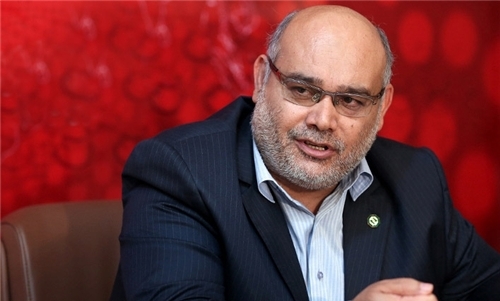 TEHRAN (FNA)- Managing-Director of Iran's Tose-e Saderat (Exports Development) Bank Bahman Vakili announced that his bank will start talks with EU bank officials to reestablish the SWIFT link between the two sides as soon as the EU court upholds its initial ruling for the removal of sanctions against the Bank.
TEHRAN (FNA)- Managing-Director of Iran's Tose-e Saderat (Exports Development) Bank Bahman Vakili announced that his bank will start talks with EU bank officials to reestablish the SWIFT link between the two sides as soon as the EU court upholds its initial ruling for the removal of sanctions against the Bank."We will negotiate with them on the reestablishment of SWIFT (the financial messaging provider for more than 10000 banking organizations, securities institutions and corporate customers) connections after the EU court issues its final verdict," Vakili told reporters in Tehran on Monday.
He said his Bank is now waiting for the EU court's final verdict after it ruled in favor of Tose-e Saderat Bank in its initial ruling and called on the European countries to provide it with strong evidence to substantiate their claim that the Bank has acted against the international laws and has helped Iran's peaceful nuclear program.
They couldn�t present any strong evidence against the Bank to the EU court and the court ruled for the annulment of sanctions against the Tose-e Saderat Bank and provided the EU with a 60-day and a subsequent 10-day deadlines to protest at the verdict, Vakili said, adding that since the EU members seem to have no corroborative evidence to substantiate their claims against the Bank, the court's final verdict will certainly be issued in favor of the Tose-e Saderat Bank, similar to what happened to Iran's Bank Mellat earlier this year.
Earlier this month, the European Union's top court thrown out sanctions imposed against eight Iranian banks and companies for their alleged ties to Iran�s nuclear energy program.
The European Court of Justice in Luxembourg ruled that there was not sufficient evidence to justify the unilateral sanctions imposed by the bloc on the Iranian entities.
Late in January, Managing-Director of Bank Mellat (the largest private bank in Iran) Ali Divandari announced that his bank has been removed from the EU's sanctions list.
"After two and a half years of intensive legal work to remove the sanctions, the court declared a ruling in support of Bank Mellat," Divandari said.
In August 2012, the Council of the EU reversed its decision for imposing sanctions against Divandari after the latter party filed a complaint at international bodies and sued the EU over its illegal action.
A London-based Indian solicitor firm Zaiwalla & Co solicitor represented Divandari's case in the European Court of Justice to challenge the legality of the sanctions.
Bank Mellat was fighting US accusations of involvement in confidential financial activities to help fund Iran's nuclear activities.
The EU Council had listed Dr. Divandari in the designated list in July 2010 on the basis that it was a legitimate part of its regime of sanctions designed to stop Iranian nuclear program. He was at the time Chairman of Bank Mellat.
The Council had designated the Bank Mellat and it considered it to be involved in Iran's attempts to develop a nuclear program and then went a step further, said Zaiwalla, by deciding to personally designate the Bank's chairperson too on the basis of his job title.
Both the bank and Dr. Divandari challenged the sanctions in the European Courts. After a long process, both were finally given a hearing before the General Court of the European Union in May 2012. Both parties presented their cases and argued that it was not lawful to impose sanctions against private sector institutions or their employees. Iran's private sector has no role to play in the acts of the Iranian state, they argued.
Washington and its western allies accuse Iran of trying to develop nuclear weapons under the cover of a civilian nuclear program, while they have never presented any corroborative evidence to substantiate their allegations. Iran denies the charges and insists that its nuclear program is for peaceful purposes only.
Tehran stresses that the country has always pursued a civilian path to provide power to the growing number of Iranian population, whose fossil fuel would eventually run dry.
Despite the rules enshrined in the Non-Proliferation Treaty (NPT) entitling every member state, including Iran, to the right of uranium enrichment, Tehran is now under four rounds of UN Security Council sanctions for turning down West's calls to give up its right of uranium enrichment.
Tehran has dismissed west's demands as politically tainted and illogical, stressing that sanctions and pressures merely consolidate Iranians' national resolve to continue the path.
The Islamic Republic says that it considers its nuclear case closed as it has come clean of International Atomic Energy Agency (IAEA)'s questions and suspicions about its past nuclear activities.
By Fars News Agency
�The Iran Project is not responsible for the content of quoted articles.











